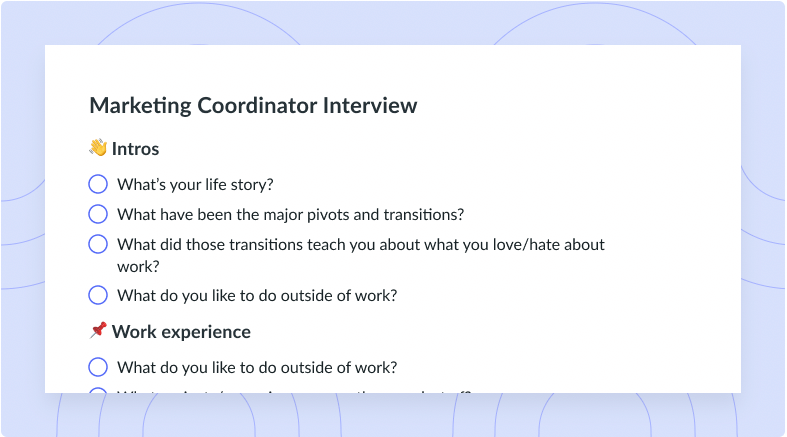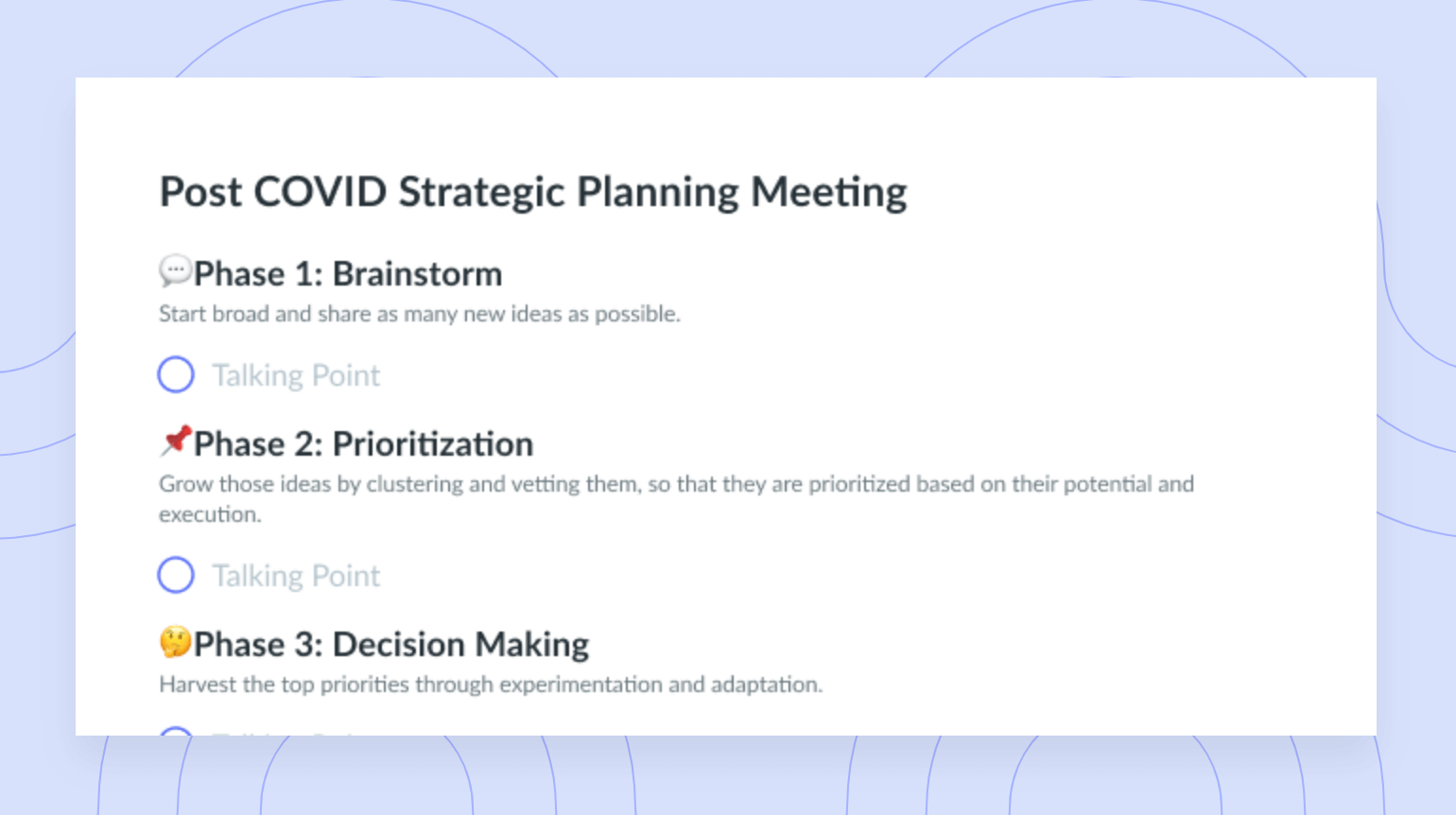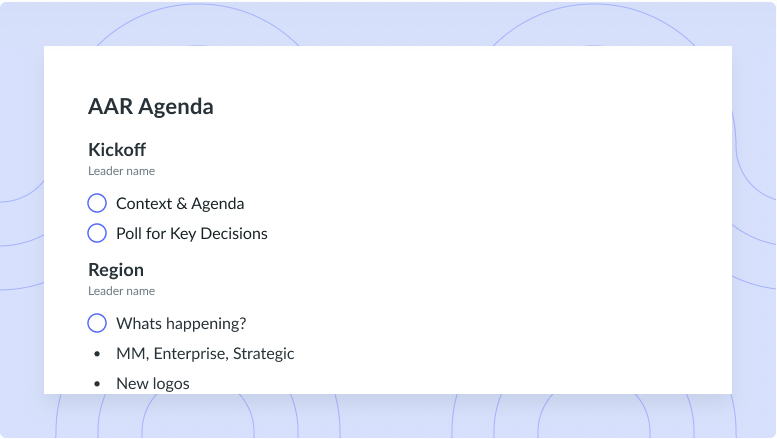Leading Through Crisis: 6 Lessons About Transparency, Optimism, and Contingency Planning
How leaders at Gainsight, Gitlab, Top Hat and other top companies are supporting and motivating their teams during the COVID-19 crisis.
There are going to be times in your journey as a leader when you’ll have to reinvent your strategy and adapt quickly to new scenarios. For thousands of leaders around the world, the COVID-19 crisis is one of those moments. The global pandemic raised a very important question: how can you lead and empower your team through turbulent situations?
According to Harvard Business Review, most leaders in high-growth companies were focusing on fostering innovation, driving revenue, and gaining market share before the COVID-19 crisis. However, many of those leaders were forced to make rapid changes in their priorities, encountering unforeseen roadblocks such as team shortages and operational challenges.
In order to help you and your team navigate through this time (and any unforeseen crises ahead), we asked a panel of experts for their advice and best practices to keep your team engaged and motivated through times of uncertainty.
Here are six important lessons from our #ManagerChats on the topic of Leading Through Crisis:
- Moments of crisis require “wartime leadership”
- Transparency is key when leading through crisis
- Nobody wants to follow a pessimist
- Leading in times of crisis requires emotional intelligence and empathy
- Planning ahead will bear fruit in times of crisis
- You can’t pour from an empty cup
1 Moments of crisis require “wartime leadership”
Ben Horowitz, the co-founder of the venture capital firm Andreessen Horowitz and author of The Hard Thing About Hard Things, wrote an article titled Peacetime CEO/Wartime CEO. In the article, Horowitz says that leaders can only survive times of crisis (or “wartime”) if they stay focused and aligned with the company mission.
This was one of the key lessons shared by Nick Stein, Chief Marketing Officer at Top Hat, during our chat:
“People talk about peacetime vs. wartime leadership. Crises like these require wartime leadership,” said Nick Stein. “Decisiveness, fewer priorities, over-communicating to ensure alignment, being comfortable with ambiguity as conditions shift, and a growth mindset.”
2 Transparency is key when leading through crisis
During a crisis, the most important thing you can do as a leader is being open and transparent. As Dan Price, CEO of Gravity Payments, told us:
“The best thing is to talk to your people. Make them part of the solution. Your ideas combined will be much stronger than anything you can do on your own — and they want to help.”
For many leaders, it can be tempting to hide or “sugarcoat” problems in times of crisis. However, as Sarah Stockdale, CEO of Growclass argued, the world’s best leaders build real trust in their organizations and build a culture where people can be honest and transparent with each other:
“Transparency is key,” said Sarah. “I feel like a lot of managers are trying to hide how scary this time is, or sugar coat it for their teams,” said Sarah. “People see right through that, and it just leads to more anxiety. People can deal with hard truths. As Brene Brown says— clear is kind.”

3 Nobody wants to follow a pessimist
In his recent book, The Ride of a Lifetime, Robert Iger argues that optimism is one of the most important qualities of great leaders.
“Even in the face of difficult choices and less than ideal outcomes, an optimistic leader does not yield to pessimism. Simply put, people are not motivated or energized by pessimists,” says Iger.
The panelists in our Twitter chat agreed. For instance, Siri Agrell (former Executive Director at OneEleven) argued that calm, comprehensiveness, and credibility are key leadership traits in times of crisis:
“Part of your role is to telegraph that this challenge can be navigated and you will help them do it. A friend once said that certain people’s pulses actually slow in a crisis. I feel this and I think it helps.”
As a way to keep team spirits up, companies such as Top Hat, Buffer, and Gravity Payments have been consciously sharing more positive news and encouraging employees to take time to socialize with each other. Here are three specific examples:
“We have a companywide Slack channel, Top Hat Love, where we share positive stories from our customers. It reminds us why we do what we do everyday.” – Nick Stein, CMO at Top Hat
“One simple funny thing we did, we created a meme channel in Slack. Posting various memes around the current situation to just help with distracting ourselves a bit and having a casual laugh.” – Marcus Wermuth, Engineering Manager at Buffer
“I try to keep them focused on our goal of helping small businesses and sharing good news as much as possible. Reminding ourselves that we can help those who are struggling helps us stay motivated.” – Dan Price, CEO at Gravity Payments
4 Leading in times of crisis requires emotional intelligence and empathy
As part of our discussion on how to lead through a crisis, we asked our panelists to describe some specific ways in which they’re showing empathy for their teammates during the COVID-19 pandemic. Their advice included things such as:
- “Ask people how they’re doing – not just at work, but personally.” – Nick Stein
- “Don’t shy away from being vulnerable.” – Colin McGuire
- “Never assume bad intent.” – Paul Teshima

Finally, Darren Murph, the Head of Remote at Gitlab (the world’s largest all-remote company), shared four actionable tips to demonstrate empathy and emotional intelligence in times of crisis:
1. Always start one-on-one meetings with the topic of “Life” — we’re humans first, colleagues second.
2. Do not celebrate working long hours.
3. Create a non-judgmental culture.
4. Don’t assume you know your team — aim to learn something new each day/week.
5 Planning ahead will bear fruit in times of crisis
Is it possible to be prepared for a crisis? According to our panel of experts, preparing for a crisis is difficult, but not impossible.
As Alaistair Luft, a veteran of the Canadian Armed Forces and author of The Battle Within said during our discussion, great leaders invest time thinking about the types of challenges that might come up for their team and understand where the potential friction points are.
“This doesn’t necessarily need to be extremely detailed. The goal isn’t to predict the future exactly, but to use it to identify ways in which your team could fail,” said Luft. “Once those weak points are identified, then decisions can be made as to whether it’s worth dedicating time and resources to shore them up, or to develop and implement contingencies.”
How can you, as a leader, prepare for future crises? Here’s some practical advice from Sabrina Fitzgerald, National Technology Sector Leader at PwC Canada, and Mike Potter, CEO at Rewind:
“Scenario planning works. Annually at least, look at a crisis management plan or develop it if you don’t have one. Plan 4-6 scenarios, natural disasters, shootings, power outages, theft, pandemics. Create a response team.”
– Sabrina Fitzgerald
“Always have a plan ahead of time. You don’t want to get into a crisis and *then* have to react to it and develop a plan. Part of leading is preparing the business for various scenarios. A few times per year think about the major risks to your business, and how you’d react to them. What would your business do if you were suddenly sick? How about your co-founder? How about your lead developer? Document your business processes in a public place where people can see and comment on them.”
– Mike Potter

According to Andrew Lockhead, Co-Founder & CEO of Stay22, a good contingency plan for a crisis can be summarized into three points:
- Pay attention to what’s happening in your environment.
- Analyze the situation and forecast all possible solutions.
- Allocate resources and make sure you have cash flow.
6 You can’t pour from an empty cup
Almost every #Managerchats attendee referenced the importance of taking care of your team’s (and your own) mental health. As a leader, it’s important to acknowledge that the world’s current situation can have an impact on your mental wellbeing, and more importantly, find ways to avoid burnout and take care of yourself, before you take care of others.
As Marianne Bulger, Founder & CEO of Prospect said during our chat on Leading Through Crisis:
“WFH + social distancing can turn into a 24/7 work extravaganza.”
For that reason, experienced leaders such as Marianne Bulger and Shama Hyder, Founder & CEO of Zen Media, are consciously practicing self-care and scheduling time away from screens – and encouraging their teams to do the same:
“For self-care, I’ve been practicing anti-screen time hours and making time to do absolutely anything other than look at my phone/computer — puzzles, cooking, physical activity, chores, crafts, etc.”
– Marianne Bulger
“As a mom, wife, and CEO – I can’t say self-care is always top of the list but I’m grateful that we have a lot of help. My greatest self-care right now comes in the form of a cup of hot tea after a peloton session.”
– Shama Hyder

Last but not least, one of the most important things you can do as a leader is finding a support network or leaders that you can rely on and share advice and challenges with. Lara Hogan, the author of Resilient Management, calls this a Manager Voltron:
“I’ve built this manager crew by being there for them, too. Support can’t be one-sided; I routinely help someone else roleplay a difficult conversation, process their management dilemma out loud, give feedback on their communication style or resume, etc,”
says Lara Hogan.
Nick Quain, the Vice President of Venture Development at Invest Ottawa, shared a similar tip during our discussion on Leading Through Crisis:
“It’s critical to have a support group you trust and ideally one you respect,” said Nick. “For me, it also helps that these aren’t the people counting on me at work, or at home, so I can be a bit more real. We all need a safe place.”
Remember you’re not alone
One of our biggest takeaways from this edition of #ManagerChats on Leading Through Crisis was that we’re not alone in what we’re going through right now. If you’ve felt a bit anxious or overwhelmed due to the world’s current situation, we want you to know that everyone is leading through this crisis without a playbook and that can be challenging at times.
One final thought that our panelists shared is that you should see crises like this one as opportunities to showcase exemplary leadership:
- “People will remember what leader you were in a moment like this. It is important to show empathy and not focus on productivity.” – Marcus Wermuth
- “Leaders need to absolutely own this moment. It really is a gift to bring community together and showcase exemplary leadership.” – Shama Hyder
- “When a team responds positively in a crisis, it builds some of the most loyal followers and trust. Leaders have so much opportunity here.” – Marissa Goldberg
If you need a reminder of the best practices covered in this article, this “letter” by Nick Mehta, CEO at Gainsight, might be helpful:
Letter to myself for crisis leadership (Chris Mehta):
1. Up my frequency of comms & transparency
2. Calm myself so I can be calm for others
3. Recognize each person’s unique situation
4. Embrace opp that crises unify the strongest teams
5. Team building we did outside of crisis makes us ready

![A Guide to Planning for Crisis Communication [+ Examples]](https://fellow.app/wp-content/uploads/2023/06/crisis-communication2.jpg)

![Crisis Management: How to Overcome a Business Crisis [+ Free Template]](https://fellow.app/wp-content/uploads/2022/06/Crisis-Management-2.jpg)










![COVID Update Meeting [Government Department] Template](https://fellow.app/wp-content/uploads/2021/09/COVID-Update-Meeting-Government-Department-preview.png)

![Crisis Management Round Table [Daily Check-In] Template](https://fellow.app/wp-content/uploads/2021/09/Crisis-Management-Round-Table-Daily-Check-In-preview.png)











